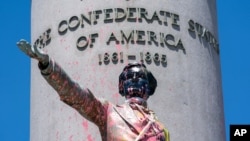Amid weeks of protests over systemic racism triggered by the death of a black man in the custody of a white police officer in Minneapolis, the U.S is facing a renewed culture war over symbols of the Confederacy – 11 states in the American South that wanted to preserve slavery in a Civil War that almost tore the country apart more than 150 years ago.
A statue of Jefferson Davis, president of the Confederacy, in Richmond, Virginia, and a statue of the Confederacy’s most honored general, Robert E. Lee, in Montgomery, Alabama, have been removed along with dozens of other Confederate monuments. Others have been vandalized.
NASCAR, the National Association for Stock Car Auto Racing, an organization that has celebrated its Southern roots since its inception 72 years ago, announced Wednesday it is banning the Confederate flag at its events and properties, declaring it “runs contrary to our commitment to providing a welcoming and inclusive environment.”
In another area of American culture, citing "ethnic and racial prejudices," streaming service HBO Max has removed “Gone With the Wind,” a 1939 Oscar-winning film for “racist depictions” that “were wrong then and are wrong today” of the antebellum South and slavery, the service said in a statement.
Now 10 military bases that bear the names of Confederate Army officers, including Fort Bragg, Fort Hood and Fort Lee are front and center. Earlier this week, a Pentagon official said that Defense Secretary Mark Esper and Army Secretary Ryan McCarthy were “open to a bipartisan discussion” of removing Confederate names from the bases. This came as the U.S. Navy and Marine Corps announced each would ban the Confederate flag from installations.
On Wednesday, the Republican-led Senate Armed Services Committee approved an amendment to the annual defense policy bill backed by Democratic Senator Elizabeth Warren of Massachusetts that would require the Pentagon to scrap Confederate names and symbols from all military assets.
“This is the right time for it. And I think it sends the right message,” Mike Rounds, Republican senator from South Dakota, said.
President Donald Trump has threatened a veto, tweeting that his administration will not even consider the renaming of “these Magnificent and Fabled Military Installations.”
It has been suggested that we should rename as many as 10 of our Legendary Military Bases, such as Fort Bragg in North Carolina, Fort Hood in Texas, Fort Benning in Georgia, etc. These Monumental and very Powerful Bases have become part of a Great American Heritage, and a...
— Donald J. Trump (@realDonaldTrump) June 10, 2020
During a June 10 briefing, White House press secretary Kayleigh McEnany read the tweet as a statement from Trump. “These monumental and very powerful bases have become part of a great American heritage in the history of winning, victory and freedom,” she said.
Trump's tweets came just as Philonise Floyd, George Floyd’s brother, delivered an emotional testimony to members of Congress, calling for an end to systemic racism. George Floyd died on May 25 while in police custody after a police officer held a knee to Floyd’s neck for nearly 9 minutes.
Symbols of exclusion, white supremacy
African Americans have long decried Confederate monuments as symbols of exclusion and white supremacy.
“There's just something very visceral about having to look at the glorification of the people and the symbols that really wanted to have you, your people, people who look like you, held in chattel slavery,” said Steve Phillips, founder of Democracy in Color, a political organization focused on race and politics, and host of a podcast by the same name.
Proponents of Southern culture and heritage deny the accusation.
Paul Gramling, commander-in-chief of the Sons of Confederate Veterans, a group that advocates on behalf of Confederate history, characterizes the backlash against symbols of the Confederacy as an “orchestrated effort to eradicate the moral fabric of this country.”
“Leave us alone. We're not coming after you, we're not coming after your heritage, we're not coming after your symbols,” Gramling said. “They just want to attack and destroy, that's what looters and rioters do.”
Long-standing contradiction
The debate over symbols of the Confederacy represents a long-standing contradiction within American public philosophy, said James Davison Hunter, sociology professor at the University of Virginia and author of “Culture Wars: The Struggle to Define America.”
The U.S. Declaration of Independence, written in 1776, states that all human beings are created equal, but history shows that equality has been denied to various groups, most egregiously to the African American population.
At the end of the Civil War in 1865, slavery was officially abolished with passage of the 13th Amendment to the U.S. Constitution, but African Americans continued to endure the devastating effects of discrimination.
During the Reconstruction, 1865-1877, Southern states passed restrictive laws to control millions of former slaves. Restrictions expanded with the passage of Jim Crow laws, which spread segregation and voting restrictions into many Northern states until after World War II.
“Even with the success of the civil rights movement in the 1960s, under the leadership of Martin Luther King [Jr.], the racial disparities continued, and they continue today,” Hunter said. He added that monuments to the Confederacy represent “the persistence of that ongoing contradiction between equality declared but equality denied.”
A reckoning
A reckoning of the history and impact of racism need to happen before the country can even begin to work toward reconciliation, said Phillips, of Democracy in Color. He added that reckoning is “happening now in a way that's actually very hopeful and inspiring,” referring to the protests.
A recent poll by the Monmouth University shows that 76% of Americans now say racial discrimination in the U.S. is a big problem, up from 51% in 2015.
Despite this changing political landscape, critics say Trump is responding to events in the past few weeks, since Floyd’s death, by stoking racial division to motivate his base.
Trump sees race as a wedge issue that can be used to his advantage for reelection, Brandon Byrd, assistant professor of African American History at Vanderbilt University, said.
Byrd said the president has revived the so-called Southern Strategy, a Republican electoral plan to increase political support among white voters in the South with racially coded appeals targeting blacks, other minorities and immigrants.
While the results of the November election remain to be seen, Byrd said, “the groundswell of dissent” may mean Trump does not have the political advantage he thinks he does.
Still a president who takes sides in a culture war will likely deepen polarization among voters.
While politics is about compromise and finding middle ground, culture is ultimately about the things that are sacred and we don’t want to compromise. “Because culture is driving our politics, these ideological divisions, our political polarization is going to be with us for quite some time,” Hunter, of the University of Virginia, said.









